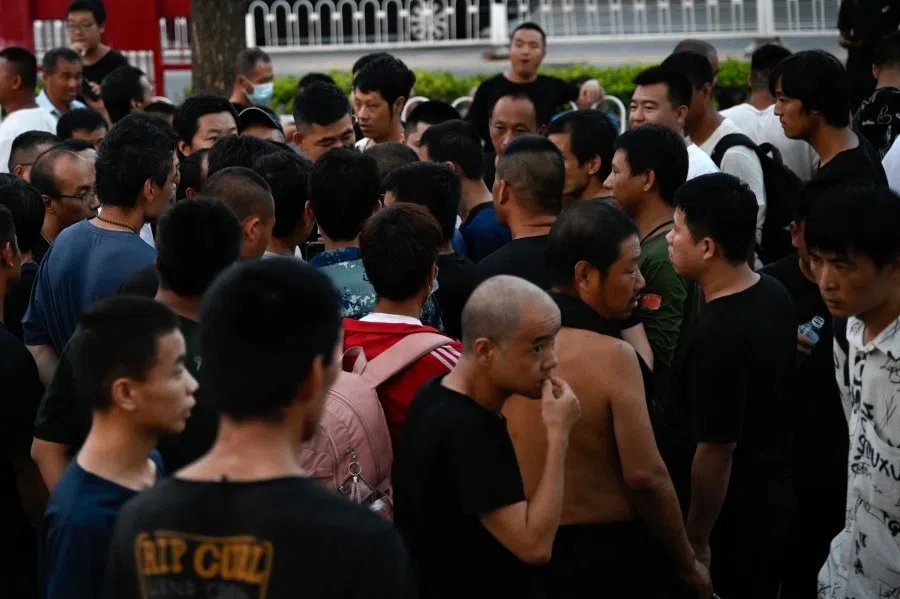Crisis of trust underlies Chinese private sector's unwillingness to invest
Erratic and unreasonable governance of local governments and a shift in public opinion towards left-wing ideology are just some of the causes for the private sector's lack of confidence in China, says academic Han Heyuan. Even with the latest measures to boost the sector, government efforts seem to fall short of expectations.

The Chinese Communist Party Central Committee and the State Council last month announced a guideline with 31 measures covering eight distinct facets to promote the growth and trust of the private economy. This prompted various industries across the country to roll out a series of policies and measures in response. While this is certainly a good thing, the effect of these measures remains to be seen.
Undermined by local governments
For one, public sentiment was not as enthusiastic as expected. Apart from Tencent CEO Ma Huateng, who wrote an article to express his opinion, other private sector bigwigs remained silent on the guidelines.
Ordinary people, including owners of small and medium-sized enterprises, gave lacklustre responses, unlike the enthusiasm they showed in the past when major reforms and favourable policies were introduced. Even Chinese netizens who tend to make mountains out of molehills showed indifference. Why is this so?
Objectively speaking, the current lack of confidence in China's private economy is not caused by a single factor, but by a combination of factors. It is affected by the transformation in the Chinese economy, structural adjustment of the private enterprises, as well as massive geopolitical influences.
Amid the existing international economic and political situation, China's export slowdown may be challenging to reverse.
Some local governments and departments have implemented policies and measures over the past few years that have suppressed and weakened private businesses and are harmful to the growth of the private sector.

However, the following factors are the main causes of the private sector's lack of confidence: first, the business sector has undoubtedly lost confidence due to the erratic and unreasonable governance of local governments and departments during a slow economy.
Some local governments and departments have implemented policies and measures over the past few years that have suppressed and weakened private businesses and are harmful to the growth of the private sector.
For instance, I've seen a subdistrict office order the demolition of small business stalls in a neighbourhood along a main road that was going to undergo renovation. The removal of these stalls was a crucial component of the improvement work because they were deemed too "low-end" in the local government's endeavour to enhance the district's image.
In other words, even though these entities and their business owners had not broken any laws or committed any crimes, they would be forced to close down as long as the administrative department classified them as low-end sectors on behalf of the market.
The resources and effort the stall owners had invested in their business and their ability to support themselves thereafter seemed unimportant to the authorities.

Nonetheless, nothing is more arbitrary and reckless than the executive order issued a few years ago that wiped out the country's after-school tutoring businesses.
... many private companies in China committed a significant amount of "original sin" during the initial stage of capital accumulation.
Sword of Damocles over the private entrepreneurs
Second, the lack of protection of the rights of the private sector and private entrepreneurs.
Undeniably, the idea that "it doesn't matter whether a cat is black or white, as long as it catches mice" has had a profound impact on China's reform and opening up for shedding outdated and restrictive ideas. It has encouraged fresh ideas, new concepts, and ongoing innovation while leading to a more comprehensive approach to reform and opening up. However, this guiding ideology inevitably has some negative effects as well.
Under this ideology, a value system gradually formed among the Chinese people, whereby the end justifies the means in everything. As a result, many private companies in China committed a significant amount of "original sin" during the initial stage of capital accumulation. In fact, this has become a Sword of Damocles hanging over the heads of many private enterprises today.
Well-known cases include Chinese entrepreneur Gu Chujun, the Chongqing crackdown on organised crime, as well as more recent cases of Lan Shili and Sun Dawu.

There are also numerous cases of entrepreneurs of small and medium-sized enterprises being accused of illegal activities, business owners being detained, and companies having their accounts frozen and unable to operate. This ultimately led to the closure of functioning businesses and the loss of jobs.
Such incidents have a significant psychological impact on entrepreneurs and private business owners, dampening their enterprising spirit.
So-called internet influencers, academics and official media have stirred up waves of noise denouncing the private economy and its enterprises and entrepreneurs.
Looming far-left ideology
Another issue is the recent shift in public opinion in China. Many extreme left-wing movements are seeing a resurgence as such ideologies are deeply ingrained in Chinese society. This has become evident in recent years.
So-called internet influencers, academics and official media have stirred up waves of noise denouncing the private economy and its enterprises and entrepreneurs. They either vehemently belittle or deny the enormous contributions made by the private economy to reform and opening up and economic development, or assert that China's private economy has fulfilled its job and should now step aside.
It is the combined effect of these factors that has caused many people to think that China's direction, its policies and the situation are changing, leaving people feeling anxious.

Over 40 years of reform and opening up have shown that China's private economy and its enterprises and entrepreneurs are tenacious survivors. They are not afraid to put in the hard work, but they fear the inconsistency and ever-changing nature of government policies, whereby the projects invested in today are not guaranteed tomorrow.
All in all, the current lack of confidence among Chinese private enterprises is fundamentally a China-style crisis of trust.
They fear being discarded like old shoes once the country has gotten its use of them. They are also concerned about shifts in domestic public opinion and the country's direction.
These worries undoubtedly increase the anxiety of enterprises and erode the confidence gained through reform and opening up. Consequently, some private entrepreneurs have chosen to leave, while others have adopted a passive approach, and some have opted to do nothing.
All in all, the current lack of confidence among Chinese private enterprises is fundamentally a China-style crisis of trust.
This article was first published in Lianhe Zaobao as "民企信心不振本质是信任危机".
Related: China's private sector has continued its rise against all odds | How Chinese private firms can be made more confident of the government's support | Can private Chinese enterprises truly 'develop boldly and with confidence'? | Private enterprises in China feel the heat of government influence | Can China rally private enterprises and boost domestic demand?



![[Big read] When the Arctic opens, what happens to Singapore?](https://cassette.sphdigital.com.sg/image/thinkchina/da65edebca34645c711c55e83e9877109b3c53847ebb1305573974651df1d13a)
![[Video] George Yeo: America’s deep pain — and why China won’t colonise](https://cassette.sphdigital.com.sg/image/thinkchina/15083e45d96c12390bdea6af2daf19fd9fcd875aa44a0f92796f34e3dad561cc)
